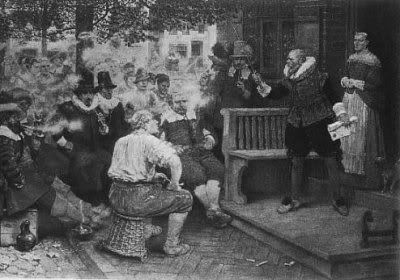
The Smokers' Rebellion by George H. Boughton (1833-1905)
Wilhelmus Kieft...had been greatly annoyed by the factious meetings of the good people of New Amsterdam, but, observing that on these occasions the pipe was ever in their mouth, he began to think that the pipe was at the bottom of the affair, and that there was some mysterious affinity between politics and tobacco-smoke. Determined to strike at the root of the evil, he began forthwith to rail at tobacco, as a noxious, nauseous weed, filthy in all its uses; and as to smoking, he denounced it as a heavy tax on the public pocket,--a vast consumer of time, a great encourager of idleness, and a deadly bane to the prosperity and morals of the people. Finally he issed an edict, prohibiting the smoking of tobacco throughout the New Netherlands. Ill-fated Kieft! Had he lived in the present age and attempted to check the unbounded license of the press, he could not have struck more sorely upon the sensibilities of the million. The pipe, in fact, was the great organ of reflection and deliberation of the New Netherlander. It was his constant companion and solace: was he gay, he smoked; was he sad, he smoked; his pipe was never out of his mouth; it was part of his physiognomy; without it his best friends would not know him. Take away his pipe? You might as well take away his nose!
The immediate effect of the edict of William the Testy was a popular commotion. A vast multitude, armed with pipes and tobacco boxes, and an immense supply of ammunition, sat themselves down before the governor's house, and fell to smoking with tremendous violence. The testy William issued forth like a wrathful spider, demanding the reason of this lawless fumigation. The sturdy rioters replied by lolling back in their seats, and puffing away with redoubled fury, raising such a murky cloud that the governor was fain to take refuge in the interior of his castle.
A long negotiation ensued through the medium of Antony the Trumpeter. The governor was at first wrathful and unyielding, but was gradually smoked into terms. He concluded by permitting the smoking of tobacco, but he abolished the fair long pipes used in the day of Wouter Van Twiller, denoting ease, tranquility, and sobriety of deportment; these he condemned as incompatible with the despatch of business, in place whereof he substituted little captious short pipes, two inches in length, which, he observed, could be stuck in one corner of the mouth, or twisted in the hatband, and would never be in the way. Thus ended this alarming insurrection, which was long known as The Pipe-Plot, and which, it has been somewhat quaintly observed, did end, like most plots and seditions, in mere smoke.--Washington Irving (1783-1859)
excerpt from A Knickerbocker's History of New York
No comments:
Post a Comment